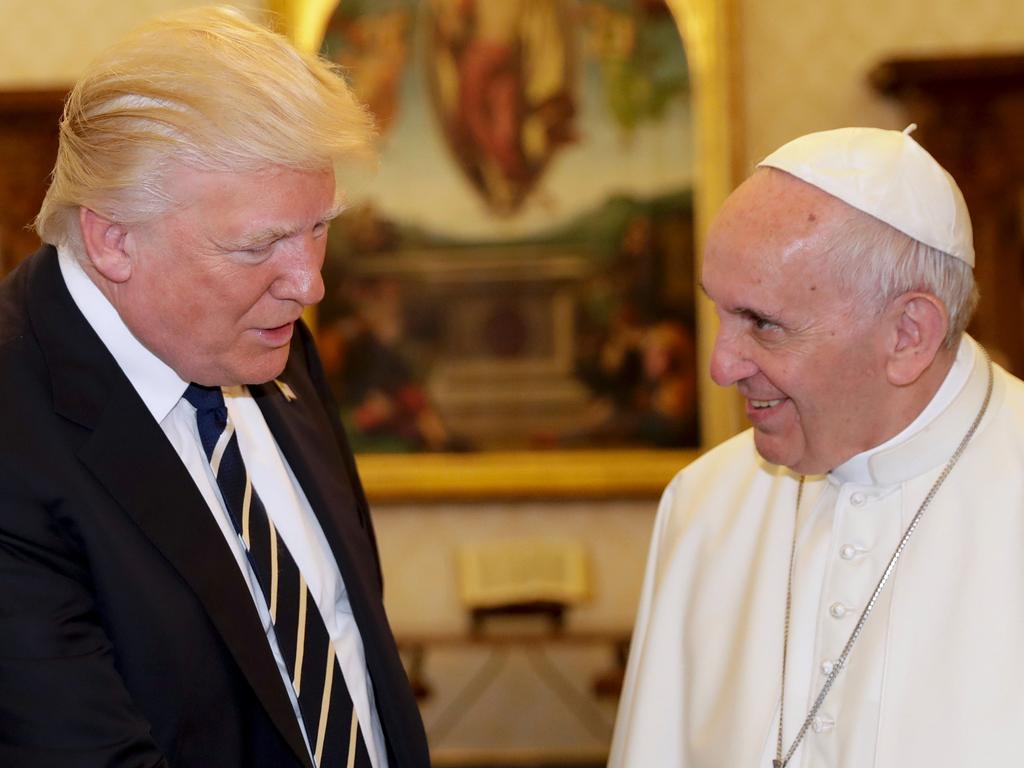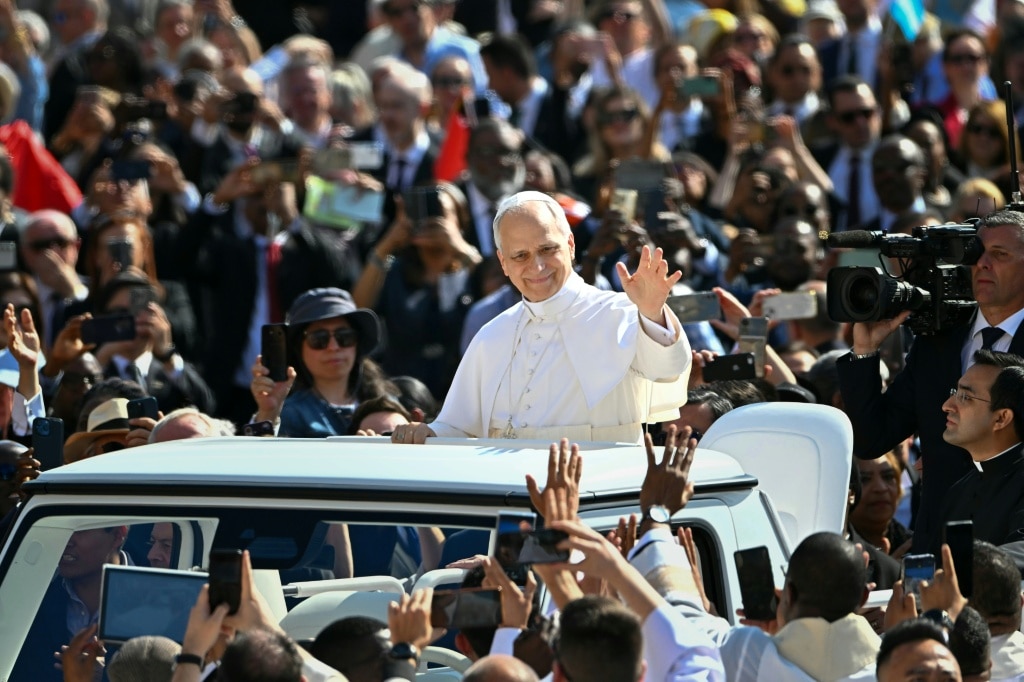Money-laundering smoking gun could bring Vatican to its knees
The explosive discovery by the late George Pell and the Holy See’s first independent auditor-general risks a financial nuclear winter for the Vatican.

The late George Pell and the Holy See’s first independent auditor-general, Libero Milone, who was sacked mysteriously in 2017, discovered a secret financial records system within the Vatican that allowed money to be wired from one account to another while bypassing proper electronic tracking – in effect a skeleton key for money laundering.
The smoking gun has long been alluded to but never released publicly by Mr Milone despite his continuing five-year battle for justice in a multimillion-euro wrongful dismissal case.
It suggests that APSA, the Vatican’s paymaster and asset manager, has for years used an accounting system that allowed international banking account numbers to be retrospectively changed on transaction records.
According to an investigation by canon lawyer and editor of Catholic news outlet The Pillar, Ed Condon, this meant money could be moved from one account to another, and what are supposed to be permanent electronic records of transfers retrospectively amended to make it look as if the funds had come from somewhere else.

The revelation also raises new questions about whether the same system was used to transfer and possibly obfuscate the provenance or destination of about $1.1m that was sent to Australia from the Vatican during the investigation into historical sexual abuse allegations against Pell.
Both Mr Milone and Pell repeated publicly over the years that their attempts to examine the accounting records of the Secretariat of State were stonewalled at every turn by the now disgraced sacked cardinal Angelo Becciu.
Documentation of the rogue system is believed to be contained in the cache of internal documents that Mr Milone has steadfastly refused to make public, preferring to pursue his case patiently and doggedly through the Vatican legal system during what has, over the past seven years, appeared to this correspondent to be more a Kafkaesque nightmare than a case for justice in a wrongful dismissal suit.

According to Condon, if Mr Milone does indeed hold details of this accounting system, its public exposure would not “just bring embarrassment to a few superannuated senior prelates caught with their hands in the cookie jar but it could lead to total, financial nuclear winter for the Vatican”.
Evidence that Vatican banking transactions could effectively be doctored would not only be categorically rejected but also red-flagged by the international banking and finance system, which is regulated by strict, global anti money laundering frameworks.
“It is hard to overstate what the potential repercussions could be. The Vatican would likely end up on an international financial blacklist of the darkest kind, frozen out of the banking system – meaning no money could come in or out of the city state except in literal, physical cash,” Condon said.
No credit card payments could be processed in Vatican City, stopping ticket sales to one of the biggest money spinners for the Holy See, the Vatican Museums – as well as all electronic funds transfers for all goods or services that crossed the border with the Italian state.

With a continuing revenue and budget crisis being one of the first problems facing the newly elected Pope Leo, it would most likely also cause a seismic shock of mistrust from the 1.4 billion Catholic faithful around the world who donate millions each year to the Pope and the Holy See.
“I think it is reasonable to say that donations would take a major hit – but even if they didn’t, there would be no way for those donations to arrive, save the good old system of clerics ferrying them over with literal bags of cash. And we know how that goes,” Condon added.
Last week, the bid by Mr Milone and his deputy, the late Ferruccio Panicco to be granted a new hearing in their damages suit was rejected for a second time, on this occasion by the Vatican Court of Appeals, which dismissed the suit as “groundless”.
The two auditors sued after they were accused of spying and forced to quit under threat of criminal prosecution by Becciu and the then head of the Vatican police, Domenico Giani. Neither Becciu nor Mr Giani have ever denied their role in the auditors’ sacking, with the then cardinal himself boasting of the auditors’ removal at the time.
The judge’s decision stated that the former auditor-general’s compensation claim had no merit when filed against the Secretariat of State: “It is less the lack of passive standing of the Secretariat of State that must be affirmed, but rather the groundlessness of the claim brought against it,” the judges said in their July 22 decision, “and consequently, the claim must be dismissed”.
A senior Italian jurist and lawyer this week described the ruling as both “strange and irrational” because it effectively means Mr Milone cannot sue the Vatican via the Secretariat of State for wrongful dismissal because neither of the two men who sacked him, Becciu and Mr Giani, had been prosecuted criminally for their actions and therefore the illegality of their actions in Vatican City has not been established.
In other words, the court says the Secretariat of State is not liable for what the two men did – despite Becciu being deputy of the secretariat at the time.
There is now the possibility that Mr Milone’s legal team could also pursue the two men themselves while continuing with the case against the Vatican.

Pope Francis personally appointed Mr Milone in the first months of his papacy to work with Pell on reforms to bring the Vatican’s sclerotic accounting systems and scandal-plagued bank and curia into line with 21st-century financial transparency laws.
In the first year, Mr Milone reported monthly directly to the pontiff until his access was denied suddenly, without explanation.
Dutch-born and educated in the Netherlands and the UK, Mr Milone came to the Vatican after working internationally at senior executive level, including a 32-year, unblemished career with the global accounting giant Deloitte in Italy and New York.
To date, the Vatican legal system has effectively stopped Mr Milone from presenting the full brief of evidence, which he argues would not only prove his case but show definitively that he and Panicco were forced out when, with Pell at the helm of Vatican’s Secretariat of the Economy, they unearthed evidence of financial misconduct.
Becciu, he believes, orchestrated a campaign to sabotage the reforms and investigations set in train by Pell on the behest of Francis. “I was fired for doing my job,” Mr Milone has said.

Becciu was stripped of the cardinal’s biretta by Francis in September 2020 and was later found guilty by the Vatican Tribunal and sentenced to five-and-a-half years in prison for financial crimes, including embezzlement and abuse of power. Mr Giani also left his position under a cloud.
Condon observed that people new to the Milone story might reasonably be tempted to look at two different courts having considered and rejected his claims and conclude that maybe Mr Milone just doesn’t have a legal case or, perhaps, that he himself is a “rogue actor” and the Vatican is merely trying to protect itself from him.
However, Condon says that having followed Mr Milone’s career and the case from the very beginning – as has The Australian – neither can be deemed a reasonable conclusion.
“Of course, the Secretariat of State is the locus of much of the most egregious and criminal financial misconduct that we know about so far, so they aren’t keen to validate Mr Milone in any way,” he said.
“They have been helped, so far, by a Vatican City judiciary making what in my humble legal opinion would consider to be at best paper-thin and at worst obviously spurious arguments to shut him and his evidence out of court.
“I cannot guess at the judges’ motivations. It may be the petty delight of part time jurists asserting themselves, it might be a genuine institutional concern to protect the Holy See.
“Having had a lot of conversations with people familiar with Mr Milone’s former work in the Vatican, I have some idea of what might be in his files. And if my suspicions are correct, it makes the Vatican’s treatment of him not just unjust but downright crazy.”
Mr Milone was contacted by The Australian but he was unavailable for comment.




To join the conversation, please log in. Don't have an account? Register
Join the conversation, you are commenting as Logout